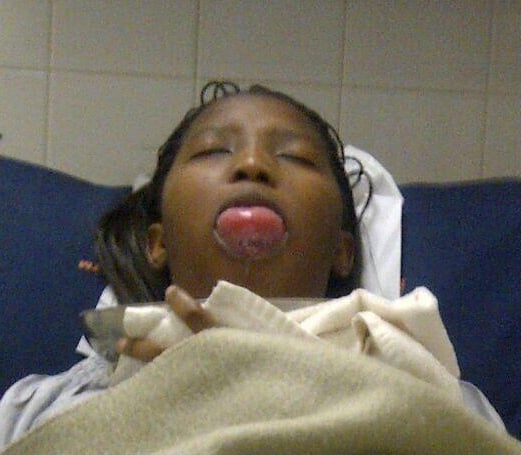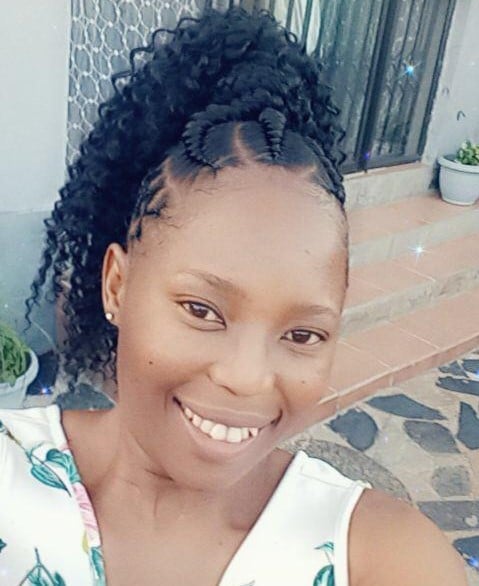

HAE sufferer, Ayanda Zwane during an attack (Photo: HAE)

Ayanda Zwane (Photo: HAE)
The highly innovative Sinovuyo South African Virtual Angioedema support centre is the virtual arm of the Lung Institute and Allergy & Immunology Centre at the University of Cape Town (UCT). It is led by Prof Johnny Peter, Head of the Division of Allergology and Clinical Immunology at Groote Schuur Hospital, UCT.
The centre aims to create awareness and educate and advise on HAE in an effort to prevent unnecessary deaths and suffering from the disease that is often mis- or undiagnosed and treated as an allergic reaction because of healthcare challenges including healthcare professionals’ lack of knowledge and understanding of the condition.
“There are various types of angioedema and although the symptoms may appear the same, HAE is not an allergic reaction and does not respond to conventional allergy treatments,” explains Janice Strydom, CEO of HAE SA and an HAE sufferer herself. “In some instances, patients have died due to a lack of correct treatment as doctors were unaware of the underlying cause,” she adds.
Most people with HAE have a problem with a gene that produces a protein in the blood called C1-inhibitor. Lack of this protein causes fluid from small blood vessels to leak into -, and under, the surrounding skin resulting in sudden localised swelling and pain. Various body parts may be affected, including the hands, feet, face, gastrointestinal tract, throat, and genitals. Swelling in the throat is the most dangerous aspect of HAE because the airway can become constricted and, without treatment, can cause death by suffocation. Swelling in the abdominal wall causes excruciating abdominal pain, nausea, and vomiting.
The centre is virtual and online, utilising a proprietary international-designed cloud-based platform. The expert independent specialist team at the virtual centre offers advice and support for patients with hereditary and other forms of angioedema; their families and carers; medical practitioners; as well as nurses caring for angioedema patients.
According to Henrik Balle Boysen, Executive Vice President and Chief Operating Officer of HAE International, the Sinovuyo South African Virtual Angioedema Centre will quickly connect people with chronic swelling disorders to specialist doctors. “This is of huge benefit to sufferers who may live in remote areas or otherwise cannot travel and need medical assistance and information.”
Prof Peter explains that the centre is named after Sinovuyo Nkelenjane, a seven-year-old girl with HAE who tragically lost her life during an angioedema attack.
“Sinovuyo’s story is a heartbreaking one with an avoidable outcome. Sinovuyo’s life and death is a call to action for us as healthcare workers and patient advocates. Her story highlights the ongoing need for education, awareness, and treatment access for all affected by this life-threatening but treatable condition. The need is even greater in places with fragile healthcare systems,” Prof Peter noted.
HAE affects around one person in 50 000. In South Africa there are only 119 patients at the moment, showing the extent of mis- or undiagnoses in the country.
What we would expect in South Africa with a population of around 60 million is at least 1 000 cases, Strydom points out.
Most of the existing cases (87) are in the Western Cape where healthcare professionals seem to be better informed, particularly because of the work Prof Peter and Prof Mike Levin, Head of Division of Asthma and Allergy, Red Cross Hospital, and their team are doing to raise awareness. No cases have been referred from or reported in provinces such as Mpumalanga and Limpopo.
Strydom says HAE SA is frequently contacted by patients suffering from unexplained bouts of swelling.
“We are excited to have a virtual centre dedicated to assisting South Africans to get an accurate diagnosis, advice, and suitable treatment – whether they have HAE or another form of angioedema,” she added.
Appointments with an angioedema specialist can be set up via the centre’s online system for a secure video-based consultation.
“We provide family member information and education as well as information on screening, the importance of early diagnosis, information about clinical trials and access to advice from a geneticist,” says Prof. Peter.
“We are very pleased that this groundbreaking new centre has been launched in time for Rare Diseases Day on the 28th of February. It is a fitting way for us to honour the legacy of Sinovuyo, and to shine a spotlight on all forms of angioedema in order to strengthen the call for improved diagnosis, and consistent access to lifesaving therapies for everyone,” concludes Prof Peter and Strydom. “Sinovuyo in Xhosa means “we have happiness”, and we hope that this virtual angioedema centre will lead to increased happiness for South Africans of all ages affected by angioedema, and their loved ones.”
To learn more visit The Sinovuyo Virtual Angioedema Centre https://aiu.haei.org/; or https://haei.org/hae/faq/ or visit www.haei.org/southafrica.
Follow HAE SA at www.facebook.com/haesouthafrica or on Instagram at @hae_southafrica.
For further information and support, contact Janice Strydom at haeadvocacysa@gmail.com or call 083 309 3569.
To watch Sinovuyo’s story visit https://youtu.be/RVn2r2dm4ko.
About Rare Disease Day
Rare Disease Day is the globally-coordinated movement on rare diseases, working towards equity in social opportunity, healthcare, and access to diagnosis and therapies for the more than 300 million people globally who live with a rare disease. Since its
creation in 2008, Rare Disease Day has played a critical part in building an international rare disease community that is multi-disease, global, and diverse– but united in purpose. It is observed every year on 28 February (or 29 in leap years)—the rarest day of the year.
In SA, Rare Disease Day has been observed since 2010 and is part of Rare Disease Awareness Month from 1-28 February hosted by Rare Diseases Genomics at Stellenbosch University Faculty of Medicine, Cape Town, South Africa. In Gauteng, an annual “Denim Walk” takes place through the Walter Sisulu Botanical Gardens west of Johannesburg to raise awareness of those living with rare diseases.
For more information, visit https://www.rarediseaseday.org/countries/south-africa/.